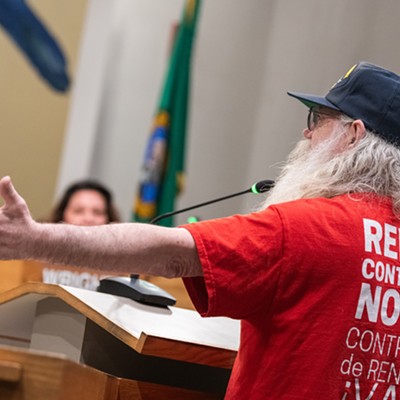Risen Woman
[
{
"name": "Broadstreet - Instory",
"component": "25846487",
"insertPoint": "4",
"requiredCountToDisplay": "4"
},{
"name": "Broadstreet - Empower Local",
"component": "27852456",
"insertPoint": "8",
"requiredCountToDisplay": "8"
},{
"name": "Broadstreet - Instory",
"component": "25846487",
"insertPoint": "12",
"requiredCountToDisplay": "12"
},{
"name": "Broadstreet - Instory - 728x90 / 970x250",
"component": "27852677",
"insertPoint": "18",
"requiredCountToDisplay": "18"
},{
"name": "Broadstreet - Instory",
"component": "25846487",
"insertPoint": "5th",
"startingPoint": "23",
"requiredCountToDisplay": "24",
"maxInsertions": 100
}
]
by Suzanne Schreiner & r & & r & & lt;span class= "dropcap " & S & lt;/span & tripped down to its bones, you might justly consider the plot of Giuseppe Verdi 's La Traviata ("The Fallen Woman") the stuff of clich & eacute;s. A beautiful woman named Violetta is a courtesan -- not quite respectable, but not a prostitute either. She's dependent on her beauty and charm to attract wealthy men. She falls in love with Alfredo, but of course his father, Giorgio, disapproves. Violetta is persuaded to let Alfredo go, because her love for him is selfless and pure. But Alfredo, mistakenly thinking she has taken another lover, becomes enraged. She dies -- of consumption, naturally -- but not before she is joined for one last aria by Alfredo, who has finally learned of her sacrifice.
If Violetta has done her work right, the audience dissolves into sobs as she gasps her last note. Gak! Surely this is bathos, which is even worse than pathos.
Or is it? Verdi didn't think so. In his own life, he had lost his first wife, as well as their two children, to illness. And the singer Giuseppina Strepponi, who eventually became his second wife, was his mistress for a number of years before they married. In January 1853, a couple of months before the opera's debut in Venice, Verdi wrote a friend that it was "a subject of the times. Others would not have done it because of the conventions, the epoch and for a thousand other stupid scruples." The composer wanted to call it Amore e morte ("Love and Death"), but the Venetian censors exercised their stupid scruples and it was later changed. For Verdi, La Traviata was a salvo directed at the status quo.
And there were many echoes down the years, all of them issuing from Alexandre Dumas' novel and play, La Dame aux Camelias. A legion of Camilles followed, with every generation taking a crack at it. The vamp Theda Bara camped it up shortly after the turn of the century. More famously, Greta Garbo made it hers in the '30s and Rudolph Valentino smoldered as Armand in a 1921 silent film. Greta Scacchi and Colin Firth took the lead roles for a TV version in 1984. More recently, the consumptive Parisian courtesan Satine coughed discreetly into her white handkerchief in Moulin Rouge, hiding from her lover the red droplets that spelled her doom. No wonder it all sounds so familiar.
But La Traviata remains relevant in socioeconomic and political terms, says Marjory Halvorson, artistic administrator of the Spokane-Coeur d'Alene Opera. While the courtesan and her demimonde may have gone the way of the whalebone corset, says Halvorson, we're still trading in the prejudices of class and ethnicity when we want to say, "You're not one of us, and we don't want you." A wealthy family, she says, might try to throw up obstacles to "someone who hasn't had a Harvard education." The same goes for the fianc & eacute; with tattoos and piercings.
Though Halvorson and Executive Director Bill Graham have wanted to do a Verdi opera for years, they say the smaller stage at the Met just didn't permit it. Halvorson points out the choice of theaters "is very limited in Spokane," but that the company's residence at the Valley Performing Arts Center at Central Valley High School has allowed it to do some things not possible in the Met's performance space.
The usable orchestra pit accommodates about 20 players, says Halvorson, compared to the 12 or 14 musicians they had to squeeze into space cadged from seats removed from the front rows of the Met. "We can also have more people on stage," she adds. Choreography planned for the production would not have been possible at the Met, she says. Or, if they had attempted it, "the choreographer would have had fits."
Local and regional singers fill the Spokane-Coeur d'Alene cast with talent; in addition, says Graham, "Violetta, Alfredo, and Germond are very strong." Leslie Mauldin (Violetta) lives in Boise but is originally from Los Angeles, where she picked up straight acting credits on TV and in film, along with operatic roles. New Yorker Chad Johnson sings the tenor role of Alfredo. Baritone David Malis, with 12 seasons at the Met to his credit, as well as appearances at La Scala and San Francisco Opera, will play Giorgio Germond.
La Traviata, says Halvorson, features "two acts that are really parties," contrasting with "Daddy basically paying off Violetta to leave his son alone." Then, "like so many heroines in the 19th-century opera, she dies in the end." But, she adds, "it's also a love story and they have lovers' spats."
The tragedy of La Traviata, adds Graham, is "the self-sacrifice of Violetta to make peace with Alfredo's father" because it is in her lover's best interest, something which elevates her in Giorgio's eyes. But it's the "incredible music" that keeps the crowds coming back 150 years later.
In fact, Halvorson laughs, "It's driving me nuts. I'm singing it in my head in the night. Right now, I'm in bed with Verdi."
La Traviata will be performed in Italian with supratitles on May 5-6 and May 12-13 at 7:30 pm at the Valley Performing Arts Center, 821 S. Sullivan Rd. Tickets: $9-$35. Call 325-SEAT.
If Violetta has done her work right, the audience dissolves into sobs as she gasps her last note. Gak! Surely this is bathos, which is even worse than pathos.
Or is it? Verdi didn't think so. In his own life, he had lost his first wife, as well as their two children, to illness. And the singer Giuseppina Strepponi, who eventually became his second wife, was his mistress for a number of years before they married. In January 1853, a couple of months before the opera's debut in Venice, Verdi wrote a friend that it was "a subject of the times. Others would not have done it because of the conventions, the epoch and for a thousand other stupid scruples." The composer wanted to call it Amore e morte ("Love and Death"), but the Venetian censors exercised their stupid scruples and it was later changed. For Verdi, La Traviata was a salvo directed at the status quo.
And there were many echoes down the years, all of them issuing from Alexandre Dumas' novel and play, La Dame aux Camelias. A legion of Camilles followed, with every generation taking a crack at it. The vamp Theda Bara camped it up shortly after the turn of the century. More famously, Greta Garbo made it hers in the '30s and Rudolph Valentino smoldered as Armand in a 1921 silent film. Greta Scacchi and Colin Firth took the lead roles for a TV version in 1984. More recently, the consumptive Parisian courtesan Satine coughed discreetly into her white handkerchief in Moulin Rouge, hiding from her lover the red droplets that spelled her doom. No wonder it all sounds so familiar.
But La Traviata remains relevant in socioeconomic and political terms, says Marjory Halvorson, artistic administrator of the Spokane-Coeur d'Alene Opera. While the courtesan and her demimonde may have gone the way of the whalebone corset, says Halvorson, we're still trading in the prejudices of class and ethnicity when we want to say, "You're not one of us, and we don't want you." A wealthy family, she says, might try to throw up obstacles to "someone who hasn't had a Harvard education." The same goes for the fianc & eacute; with tattoos and piercings.
Though Halvorson and Executive Director Bill Graham have wanted to do a Verdi opera for years, they say the smaller stage at the Met just didn't permit it. Halvorson points out the choice of theaters "is very limited in Spokane," but that the company's residence at the Valley Performing Arts Center at Central Valley High School has allowed it to do some things not possible in the Met's performance space.
The usable orchestra pit accommodates about 20 players, says Halvorson, compared to the 12 or 14 musicians they had to squeeze into space cadged from seats removed from the front rows of the Met. "We can also have more people on stage," she adds. Choreography planned for the production would not have been possible at the Met, she says. Or, if they had attempted it, "the choreographer would have had fits."
Local and regional singers fill the Spokane-Coeur d'Alene cast with talent; in addition, says Graham, "Violetta, Alfredo, and Germond are very strong." Leslie Mauldin (Violetta) lives in Boise but is originally from Los Angeles, where she picked up straight acting credits on TV and in film, along with operatic roles. New Yorker Chad Johnson sings the tenor role of Alfredo. Baritone David Malis, with 12 seasons at the Met to his credit, as well as appearances at La Scala and San Francisco Opera, will play Giorgio Germond.
La Traviata, says Halvorson, features "two acts that are really parties," contrasting with "Daddy basically paying off Violetta to leave his son alone." Then, "like so many heroines in the 19th-century opera, she dies in the end." But, she adds, "it's also a love story and they have lovers' spats."
The tragedy of La Traviata, adds Graham, is "the self-sacrifice of Violetta to make peace with Alfredo's father" because it is in her lover's best interest, something which elevates her in Giorgio's eyes. But it's the "incredible music" that keeps the crowds coming back 150 years later.
In fact, Halvorson laughs, "It's driving me nuts. I'm singing it in my head in the night. Right now, I'm in bed with Verdi."
La Traviata will be performed in Italian with supratitles on May 5-6 and May 12-13 at 7:30 pm at the Valley Performing Arts Center, 821 S. Sullivan Rd. Tickets: $9-$35. Call 325-SEAT.
















